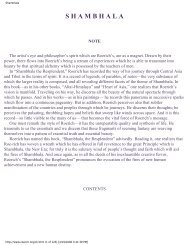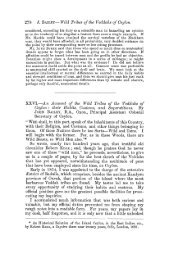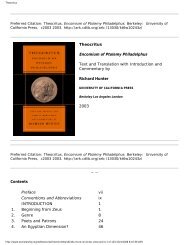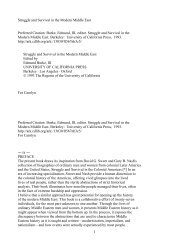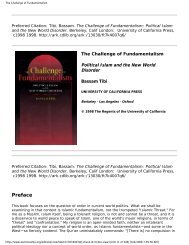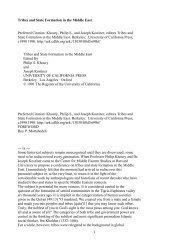Between Two Worlds Kafadar.pdf
Between Two Worlds Kafadar.pdf
Between Two Worlds Kafadar.pdf
You also want an ePaper? Increase the reach of your titles
YUMPU automatically turns print PDFs into web optimized ePapers that Google loves.
Still another mystery surrounds the early years and identity of Osman. In the<br />
earliest Byzantine sources referring to him, his name is spelled with a (Image<br />
not available.) as Atouman or Atman. Considering that the Arabic name `Uthman<br />
and its Turkish variant `Osman are regularly rendered with a q or (Image not<br />
available.) or (Image not available) in the Greek sources, some scholars have<br />
concluded that the founder of the Ottoman beglik did have a Turkish name at<br />
first, perhaps At(a)man, and that it was later changed to `Osman .[11]<br />
Curiously, one of the earliest Arabic sources to mention his name, the<br />
geographical work of al-`Umari from the 1330s, also spells it with (Image not<br />
available) in one of two occurrences (but "correctly" in another mention).[12]<br />
And there is an echo of this "other name" in a later Turkish source, the<br />
hagiography of Haci Bektas Veli , written in the fifteenth century.[13]<br />
One does not need to revive Gibbons's theory of Osman's conversion to Islam from<br />
paganism to consider this name change possible and relevant. Turkish names were,<br />
as they are now, commonly given to children born Muslim, and this practice,<br />
though diminished, did not disappear within the Ottoman family very quickly; the<br />
name of Ertogril was given to the eldest son of Bayezid I ca. 1376 and that of<br />
Oguz to a son of Prince Cem in the second half of the fifteenth century. Orhan's<br />
imam, to choose an example from the class of religious functionaries, called his<br />
son Yahsi . Namely, being born with a Turkish name certainly did not imply being<br />
born non-Muslim.[14] If Osman was called Atman, however, and adopted a similar<br />
but more prestigious Arabic name later on, this could point to an important<br />
turning point in the self-identity or political ideology of the<br />
― 125 ―<br />
early Ottomans, probably an intensification of their claims to representing the<br />
struggle for the faith sometime after the huruc of Ertogril's son.<br />
The fragmentary nature of Bithynia's political landscape at the time can hardly<br />
be exaggerated. The dynamics of political life in the area seem to have been<br />
shaped by units as small as villages, small towns, nomadic tribes (with no<br />
sizable confederative articulation), and dervish or monastic religions<br />
communities and attached estates. These small units fashioned their political<br />
destinies mostly within the matrix of local dynamics, usually with minimal and<br />
sporadic intervention by the authorities of established political centers. Many<br />
decisions and preparations concerning war and peace, alliance and conflict, were<br />
apparently made locally by the leaders of those communities. Even the long siege<br />
of Bursa, one of the most important towns in Bithynia, was suffered by its<br />
inhabitants with no significant involvement on the part of the imperial<br />
government in Constantinople.[15]<br />
This political wilderness is one of the important reasons why the notion of<br />
"frontiers" is applicable to western Anatolia at this time. However, the area<br />
was not free from all interference by the larger authorities in political<br />
centers. Not only did they have real muscle, which they occasionally used in<br />
these regions, but perhaps more importantly they also maintained significant<br />
control over mechanisms of legitimation that were part of the political language<br />
of the frontiers. Thus, the autonomy of small frontier powers should not be<br />
exaggerated. Whatever their levels of physical and/or mental distance, the<br />
110




